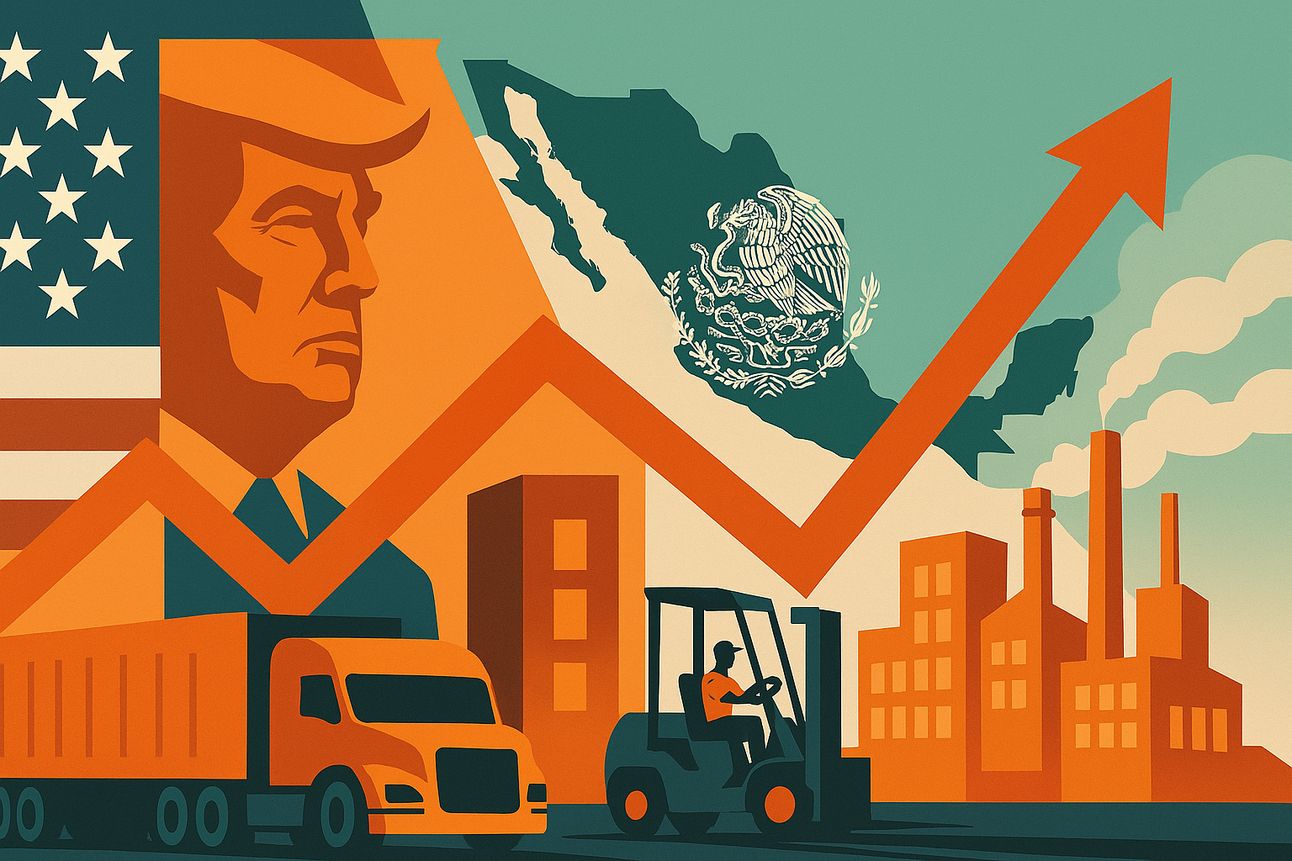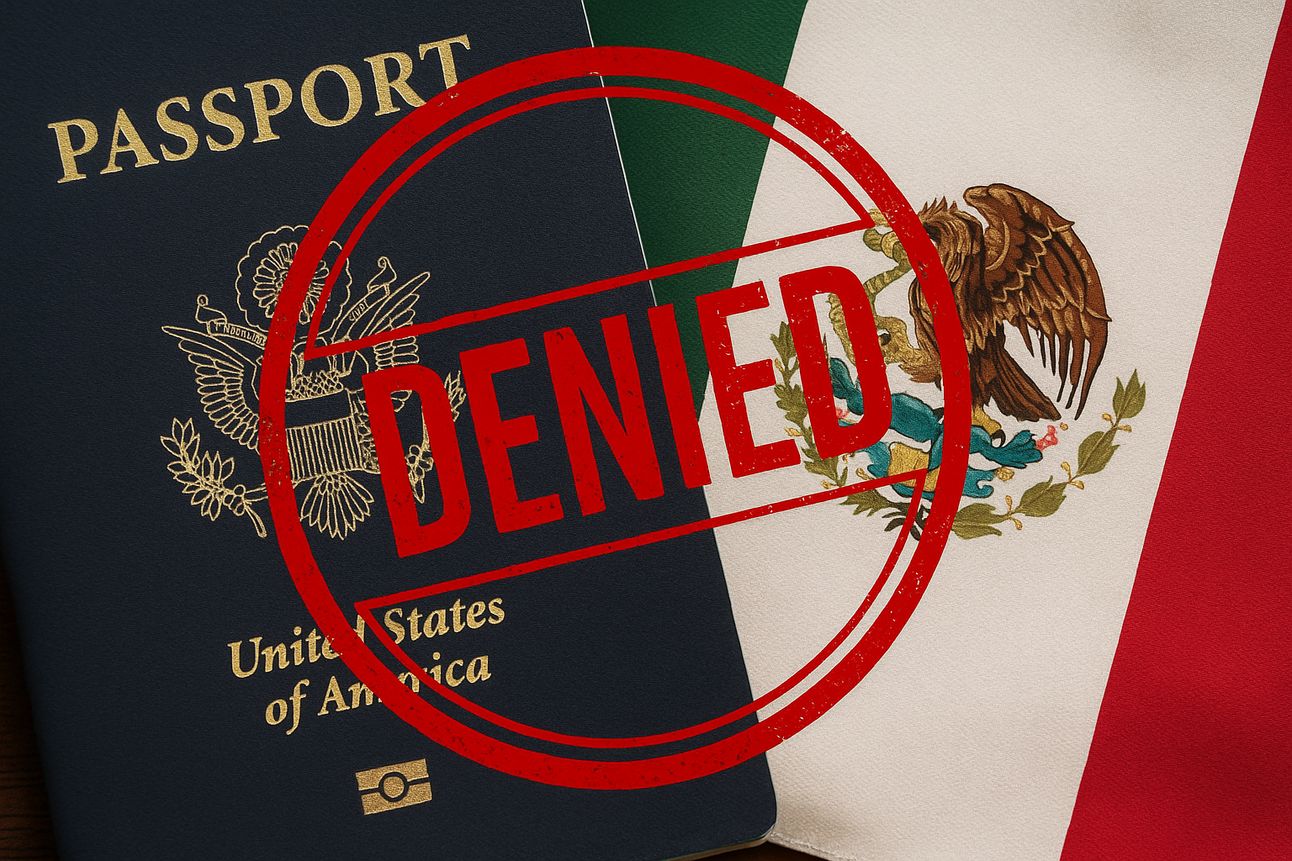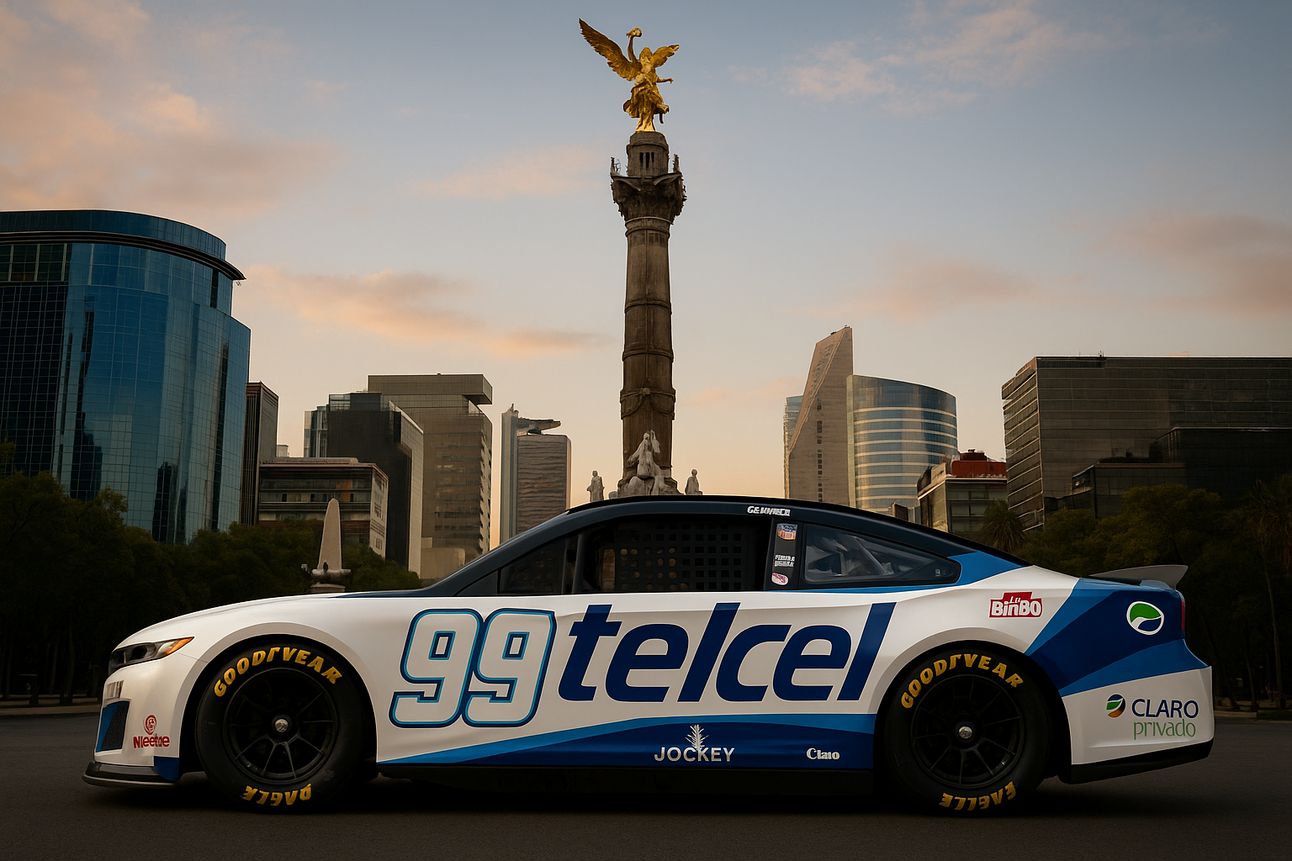What’s New This Week
{{Firstname|Good morning}}, this week, the border is buzzing with action—from visa revocations aimed at high-level Mexican officials to a NASCAR debut in Mexico City that puts Latino economic power in the fast lane. As U.S. companies accelerate nearshoring strategies in response to tariff threats, the United States is also quietly using its visa policy to send strong signals on corruption. Meanwhile, a Trump-era gun loophole returns to the spotlight, and Walmart warns tariffs may soon hit your wallet.
First time reading? Join thousands of intellectually curious readers. Sign up here.
Inside Special Sections
Trade Winds: Why U.S. companies are racing to Mexico—and what it means for investors.
Power Move: The U.S. may be revoking visas, but it’s restoring pressure for accountability.
The Border Buzz: NASCAR’s Mexico City race isn’t just entertainment—it’s economic diplomacy.
The Daily Newsletter for Intellectually Curious Readers
Join over 4 million Americans who start their day with 1440 – your daily digest for unbiased, fact-centric news. From politics to sports, we cover it all by analyzing over 100 sources. Our concise, 5-minute read lands in your inbox each morning at no cost. Experience news without the noise; let 1440 help you make up your own mind. Sign up now and invite your friends and family to be part of the informed.
The Quick Courier
U.S. Revokes Governor’s Visa
The governor of Baja California was reportedly denied entry to the U.S.—a potential signal of Washington’s growing willingness to quietly confront corruption and cartel influence in Mexico.
Trump Loophole Supercharges Rifles
A little-known device—legal under Trump rules—lets rifles fire at near-automatic speeds, reigniting debate over gun policy and loopholes with deadly consequences.
Walmart Warns of Tariff Pain
Walmart is sounding the alarm: rising tariffs could drive up prices for American families—offering a preview of the inflation shockwaves a second Trump trade war might unleash.
Border Wall vs. Wildlife
Trump’s push to restart border wall construction could devastate migration corridors, threatening endangered species and reigniting tensions over land, sovereignty, and environmental survival.
Fuel Smuggling Crisis Grows
A silent but costly smuggling operation is siphoning millions from Texas—fuel theft at the border is now a major economic and security threat hiding in plain sight.
Brooklyn Crash Kills Mexican Sailors
New details emerge about the Brooklyn Bridge tragedy that left two Mexican Navy sailors dead—raising urgent concerns over communication breakdowns and binational maritime cooperation.
Trade Winds
From Uncertainty to Urgency: How U.S. Trade Policy Is Fueling Mexico’s Manufacturing Surge

Fueling Mexico’s Manufacturing Surge
What happens when global manufacturers lose confidence in predictability? They start moving fast. And right now, many are racing straight toward Mexico.
During my recent trip across Mexico, I met with several companies already feeling the effects of rising U.S. protectionism and the looming return of tariffs—especially those hinted at by Donald Trump. These aren’t theoretical concerns. One manufacturer I spoke with, a supplier of specialized vehicle parts for major U.S. automakers, told me they’re accelerating their expansion timeline by over a year. Why? Because customers are warning them: “We can’t risk being caught in another tariff storm.”
We’ve seen this movie before—Trump’s trade war with China upended global supply chains. Now, many U.S. companies and their suppliers are proactively pulling production out of Asia. But the new twist is this: they’re not waiting to be forced—they’re preemptively relocating to Mexico.
Tariffs Aren’t Just a Tax—They’re a Catalyst
The return of tariff threats has shifted nearshoring from a long-term strategy into a short-term scramble. Companies that once weighed options slowly are now speeding up land acquisition, accelerating plant builds, and desperately seeking capital for new equipment and facilities.
They’re not just trying to avoid import taxes. They’re trying to lock in resilience—shorter delivery times, USDA/FDA compliance, and the ability to tweak operations without relying on fragile transpacific logistics. For sectors like automotive, medical devices, electronics, and aerospace, Mexico’s skilled labor force and trade advantages under the USMCA make it the only logical option.
But here’s the real bottleneck: financing. Many mid-sized manufacturers in Mexico have the contracts, demand, and know-how—but they lack the capital to scale quickly enough. This is where opportunity meets urgency.
The Capital Gap—and How We’re Bridging It
Through Intermestic Capital, we’re working to fill that gap. Our investment focus is aligned with national security and critical infrastructure—exactly the type of projects at the heart of this shift. Whether it’s helping a Mexican auto parts supplier expand into a new facility near the border or partnering with U.S. firms looking to solidify local sourcing, we’re leveraging our binational reach to create durable solutions.
At Intermestic Partners, we’re also advising stakeholders—from investors to government agencies—on how to structure these new ventures for long-term success. This includes navigating regulatory risk, securing permits, and aligning with U.S. compliance standards.
I’ve seen the power of good policy—and the damage of bad policy—up close. From my time as Mayor of a border city to serving as Chief of Staff at U.S. Customs and Border Protection, I understand how shifts in Washington affect the factory floor in Hermosillo, Saltillo, or Juárez. Today, I use that insight to help companies and investors stay one step ahead of the next disruption.
Mexico’s Moment—But Only If We Act Fast
This isn’t just a Mexico story. It’s a North American moment. But moments pass. If we fail to support this wave with the capital, logistics, and regulatory certainty it needs, we risk letting another geopolitical opportunity slip away.
The good news? There are smart companies, forward-thinking leaders, and determined investors ready to build. The question is whether we’ll move fast enough to meet the moment—or whether uncertainty will win again.
I believe we can rise to the occasion. But we’ll need to work across borders, across sectors, and across ideologies to make it happen.
Power Move
Visa Power—A Quiet Shift in U.S. Strategy Toward Mexican Corruption?

Visas Denied
This month, reports surfaced that the U.S. government has revoked visas from several high-profile Mexican officials, including the current governor of Baja California. While the details remain murky and no formal charges have been filed, the implications are hard to ignore: Washington may be signaling a more assertive posture on corruption and security concerns inside Mexico.
As someone who served at U.S. Customs and Border Protection, I can tell you this—the bar for visa revocation is not high, especially when national security or serious criminal allegations are involved. Entry into the U.S. is a privilege, not a right. If an official is under credible scrutiny, even without a formal indictment, the U.S. has the discretion to quietly revoke a visa. It’s a tool designed for moments exactly like this.
What makes this development significant is the profile of the individuals reportedly affected. Revoking travel privileges from senior political figures—especially sitting governors—is rare, and it may mark the start of a more proactive approach by U.S. authorities toward issues of governance and accountability in Mexico.
This doesn’t mean guilt has been proven, and the individuals in question deserve due process in their own country. But it does suggest that U.S. agencies are watching closely—and are willing to act when red flags appear.
For a binational relationship as complex and interdependent as ours, trust in public institutions matters. Investors, trade partners, and border communities all benefit when rule of law is upheld. And as nearshoring accelerates and U.S.-Mexico collaboration deepens, we can’t afford to ignore the influence of corruption on regional stability.
We don’t yet know if this is a one-off, or the first step in a broader pattern. But one thing is clear: the U.S. is starting to use quiet pressure to demand higher standards. And that, in itself, is a power move worth watching.
The Border Buzz
Racing Toward Relevance—Why NASCAR’s Move to Mexico City Says Everything About Latino Power

Sports Diplomacy
This June, NASCAR will make history with its first-ever Cup Series race in Mexico City—a landmark moment that reflects more than just a growing fan base south of the border. It signals a deeper shift: America’s most traditional sports leagues are finally recognizing the economic and cultural power of Mexican Americans.
When Kyle Busch visited CDMX to promote the upcoming race, it wasn’t just a media tour—it was a strategic move. NASCAR isn’t dipping its toe into international markets. It’s going full throttle into Latino engagement, and Mexican Americans are at the center of that strategy.
Here’s why: Mexican Americans make up over 60% of the U.S. Latino population, and Latinos overall contribute more than $3.4 trillion in economic output—making U.S. Latinos the fifth-largest economy in the world if measured as a standalone nation. They’re young, brand-loyal, and increasingly influential in shaping consumer behavior, political outcomes, and cultural trends.
As someone who’s worked at the intersection of policy, business, and border relations—from my time as a mayor on the U.S.-Mexico border to serving in federal government and now advising investors and institutions—I’ve seen how powerful cultural exchange can be. Sports are often the fastest way to build trust, spark dialogue, and create common ground.
This isn’t just good business—it’s smart diplomacy. Events like the NASCAR Cup race in CDMX bring people together around adrenaline, identity, and shared passion. They also open doors to tourism, investment, and long-term collaboration.
That’s why I’m actively engaged in efforts to build platforms where sports, commerce, and diplomacy can come together. Whether it's through motorsports, boxing, or soccer, the opportunity to connect communities and leaders across borders is one we can’t afford to miss.
Latino audiences are no longer a niche—they’re the engine. And the leagues, brands, and governments that understand that will be the ones who lead the next generation of North American engagement.
Power Poll
Do you believe the U.S. should create a more streamlined legal pathway for immigrant workers in essential industries like agriculture and manufacturing?
Join the Conversation
Thanks for reading this edition of my newsletter! I'd love to hear from you. Share your thoughts about what you think are the most critical issues that need to be addressed. Email me at [email protected] or connect with me on social media using the hashtag #Intermestic.
Stay Informed, Stay Connected!
Subscribe to my blog at www.marcolopez.com.
Follow me on X, LinkedIn, and Facebook for the latest news and updates.
Share this newsletter with your network and help spread the word!
Let's keep the conversation going!

